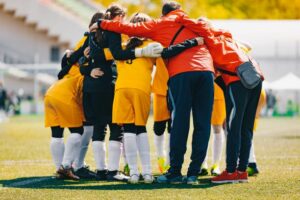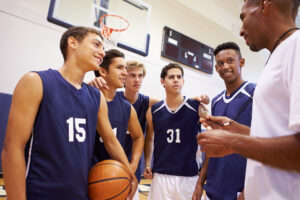As youth sport researchers, we seek to understand how youth develop and transfer life skills. In recent years, cultural issues have urged us to evolve our understanding of life skills. For instance, the Black Lives Matter and #MeToo movements continue to raise awareness of inequities within sport and beyond. Additionally, the climate change movement has helped to illustrate the disproportional impacts on Indigenous populations. As such, over the past few years, we have intentionally and critically challenged what life skills are commonly believed to be.
Being mindful of historic and ongoing systems of oppression, such as racism, sexism, and homophobia, among others, we believe that life skills can be so much more than traditional concepts like self-control, effort, and teamwork. As scholar-activists, if our work reflects the diversity of lived experiences and dynamic environments in which youth live, we can reimagine not only life skills, but also positive youth development (PYD), as an approach to promote social change.
This blog builds off a 3-part blog series published in 2019 that discussed the importance of teaching life skills through sport and transferring life skills beyond sport.
An important step in evolving life skills involves creating alignment between how athletes learn and use life skills, and how these skills are understood in the context of social movements.
Three ways of evolving life skills through a social justice lens
1. Expand the meaning of life skills
When we think of life skills, we often think of “traditional” life skills, including teamwork, communication, or leadership. However, we can extend our understanding to consider teamwork as a critical skill needed to engage with individuals and groups that may differ culturally, or hold different belief systems.
Similarly, through a social justice lens, leadership can consist of advocating for change and working toward a socially just society, which can involve coaches, captains or other informal leaders taking part in a peaceful protest or standing up for a teammate harassed because of their racial or ethnic background, gender identity, or sexual orientation.
2. See life skills through a sociopolitical lens
We should also consider how certain life skills may unintentionally uphold inequities. For instance, some life skills, such as resilience and grit, may be loaded concepts that perpetuate the notion that youth who face barriers must navigate environmental stressors and challenges that youth from more privileged backgrounds may not have to navigate. As a sport system, can we work to change the odds, instead of asking youth facing barriers to continuously work to beat the odds?
3. Teach life skills that address youth’s social realities
Youth are more likely to develop and transfer life skills if they can relate to them. As such, we must ensure life skills are culturally relevant and based on youth’s social realities. Life skills mean different things to different people, in different situations. However, how a specific life skill is valued, learned, and ultimately exhibited may be different for youth living in upper-middle class households compared to youth living in low-income public housing or for girl-identifying youth compared to boy-identifying youth.
Taking action
The youth sport landscape has tremendous potential to be a vehicle for positive change. Below we make calls to action for three stakeholder groups to help support both top-down and bottom-up changes (Spaaij et al., 2020):
What you can do if you’re a sport administrator:
- Ensure that evidence-informed professional development opportunities are available for coaches and other sport staff to help them identify abuse, prevent inappropriate behaviours and become aware of how unintentional actions may harm some athletes (Tam et al., 2021)
- Create equitable policies, organizational processes and hiring practices. For instance, pay and compensation should be reflective of the job duties, not the gender of the candidate
- When possible, make coach education compulsory, particularly educational opportunities that integrates youth development and social justice content (for example, anti-racism training)
- Pursue collaborative opportunities with community-based social justice organizations that represent the diversity of youth athletes within your programming (Jones et al., 2020)
 What you can do if you’re a coach:
What you can do if you’re a coach:
- Consider what social injustices are prevalent throughout your community and impact the youth athletes on your team (Camiré et al., 2022)
- Reflect on your coaching philosophy to ensure that your approach allows for the deliberate discussion and practice of life skills development and transfer (Bean et al., 2018)
- Teach life skills in ways that reflect a deliberate commitment to equity rather than upholding the status quo. This requires a focus on seeking out diversity, promoting inclusivity, and ensuring all athletes have equitable opportunities (Camiré, 2022)
- Make sure your coaching practices are relayed in a culturally competent manner (this means that you respect and can thoughtfully engage with cultures and backgrounds other than your own). Similarly, demonstrate cultural humility (this means it’s okay that you may not fully understand the lived experiences of all athletes on your team, as long as you respect it)
- Collaborate with sport administrators, other coaches, athletes, and caregivers to foster a welcoming environment for everyone. Create space for athletes to share experiences and advocate for issues that are important to them. Build community connections as you collectively decide what is relevant to your team or organization in terms of social justice efforts
 What you can do if you’re an athlete:
What you can do if you’re an athlete:
- Look out for the needs of teammates, particularly those who may be underrepresented on your team
- Seek out opportunities to get involved in community-based efforts to promote social justice or challenge social injustices (Checkoway, 2009)
- Develop relationships with athletes from other sport teams and learn about each other’s unique cultural traditions and values
- Be a leader and mentor for other athletes, especially for new members of your team
Sport can serve as a setting for addressing social justice. By expanding the meaning of life skills, seeing life skills through a sociopolitical lens, and teaching life skills that address youth’s social realities all stakeholders in the sport system can work together to progress the positive development of youth and evolve life skills.
 What you can do if you’re an athlete:
What you can do if you’re an athlete: